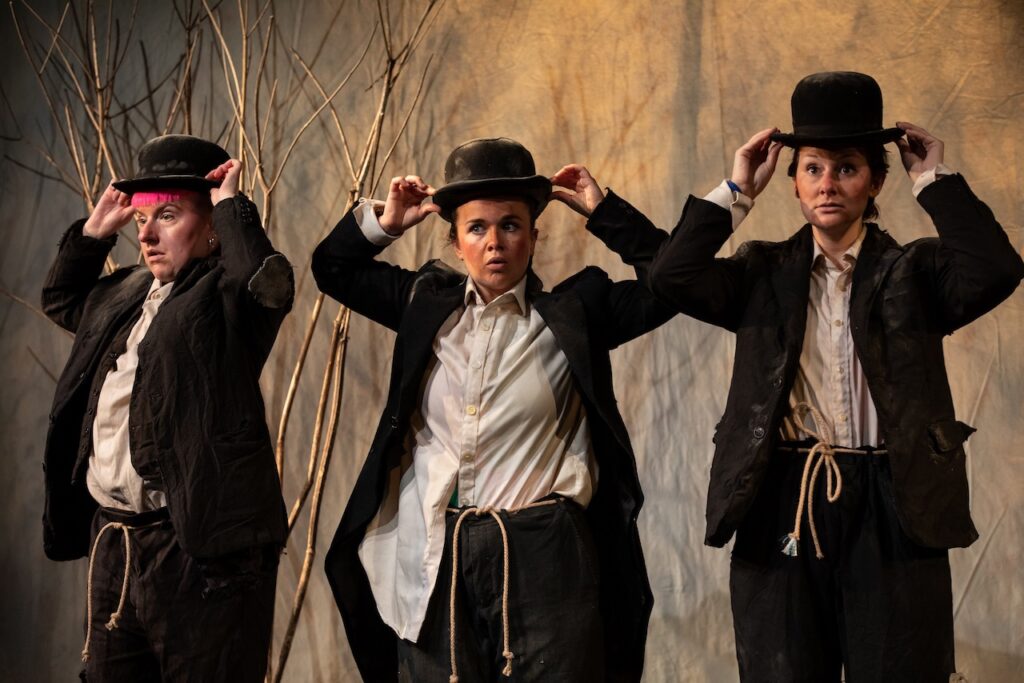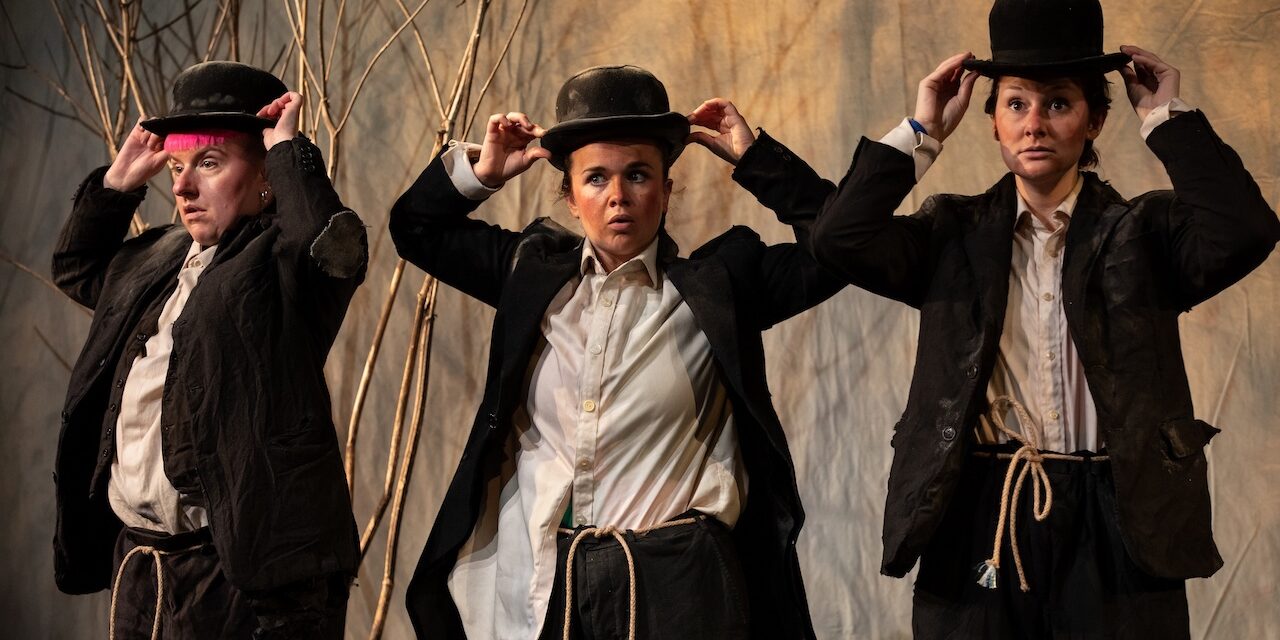
Two people wait beneath a solitary tree on a country road – it’s a familiar scene, but this is not Waiting for Godot. Waiting for Godot was written by a man, for men, and Silent Faces aren’t men. So, what are they waiting for? It’s time to dig it all up and start again.
Written and performed by Josie Underwood, Cordelia Stevenson, Jack Wakely, Godot is a Woman interrogates permission, patriarchy and pop music in a comical response to the Beckett Estate’s ban on women and non-binary actors performing in Waiting for Godot.
StageTalk asked the trio Silent Faces about themselves as they bring their signature style of playful and political physical theatre to Bath (Ustinov Studio 22nd June) and Bristol ( Tobacco Factory Theatres, 28th June-1st July) on their first UK-wide tour, following successful runs at the Pleasance Theatre and Edinburgh Festival Fringe.
What events or influences led to the creation of Silent Faces? How did you arrive at that name?
The three co-directors of Silent Faces, Cordelia Stevenson, Josie Underwood and Jack Wakely came together whilst studying on the BA in Drama and Theatre Arts at Goldsmiths, University of London between 2012 and 2015. Goldsmiths was then and is now an institution notorious for pushing artistic boundaries, which was certainly the pull for all of us to study there. The seeds of Silent Faces were planted in our second year during a module called Audience in which we studied clowning and discovered each other’s funny bones. From there-on we continued working together, devising our first show Follow Suit – a clown show about corporate responsibility – as our degree-show piece and arriving on the name Silent Faces. ‘Silent’ because our work will always be non-verbal to a certain extent, with influences from a great history of silent clowns. ‘Faces’ because you can’t miss our enormous silly mugs when we’re on stage. However, to us a ‘silent face’ is a little more and it’s about laughter. When something has really – and we mean really – tickled you and you’ve laughed so much that you’ve laughed all that you can laugh. You’ve laughed so much that you’re exhausted. And your face drops to nothing, to the space inbetween, that’s a ‘silent face’. Pretentious right? But it’s a lovely name for a theatre company!
You have described your approach as ‘high concept’ and ‘metaphorical’. Can you expand on that?
Our approach to making theatre is knowingly sneaky. Often starting very playful with non-verbal clowning and comedy, we then look to go beyond what appears on the surface, with more to say than is at first apparent. This is where the idea of ‘concept’ and ‘metaphor’ comes into play. Each show we make starts with a problem, and we then find a concept or metaphor that helps us articulate that problem. For our first show Follow Suit the ‘problem’ was corporate greed and responsibility: big businesses sweeping things under the rug all in the name of profit. On stage this was articulated by creating an office space where suited and silly office workers kept on working despite their workplace filling up with remnants of the violent atrocities their company was responsible for. This visual metaphor of a place of order being struck with violence and disorder allowed us to play with the non-verbal whilst still ‘talking’ about more P/political, social and moral issues.
For Godot is a Woman, the starting concept is us waiting on hold to get through to the Beckett estate to ask them for permission to perform Waiting for Godot. Here’s a wealth of ways in which to talk about gender barriers, ownership of art and permission. The metaphor of waiting to wait is more fruitful than we could ever have imagined!
When creating a piece, do you have a specific kind of audience in mind?
It depends on the show and there will be something in each show that attracts a slightly different audience. With Godot we’ve gone more mainstream than our previous works, attracting Beckett lovers, Beckett haters and Beckett no-idea’rers alike. Again, it’s sneaky. You might think this is all about Sammy B but it’s way more than that. This show is geeky, yes, but it’s also camp and cheeky and a bit bolshy. Ultimately the audience we attract will be one that enjoys work that is playful, a little bit silly, but also that gives you a chance to have a think.
Waiting For Godot was undoubtedly ground-breaking back in the 1950s. Despite your opposition to Beckett’s refusal to allow non-male actors to perform it, do you admire it as a work of theatre? If so, why?
Absolutely! We are where we are with Godot is a Woman due to our shared admiration for Waiting for Godot and genuine desire to perform it. One of the things we return to throughout the show is this idea of ‘a classic’: How does something become a classic? What does a classic need? And who decides?
With Waiting for Godot, Beckett perfectly articulates how uncomplicated and alike we are as a human race; how little things keep us entertained, how we are all terrified of not having any answers to life’s big questions and how very good we are at just getting on with it anyway. In this way Godot is so relatable to any audience, because even if you do find it boring and pointless, and even if it is, can’t life sometimes feel kinda like that anyway?
Beckett wrote a number of plays with very strong roles for women. Why do you think he objected to women performing Waiting For Godot?
We asked this a lot whilst making the show and we now ask this a lot during the show! It’s likely that it is purely an authorial copyright issue: the writer said that’s how it should be and when questioned on it was adamant that that’s how it was written and that’s how it should stay. He was completely immovable! And that wasn’t just with this play. The problem with this objection however is the wider implication it has on how women and non-binary people are perceived, and what we are allowed to represent. Limiting a director to exact stage directions (a dress that must be grey, an actor that must stand still, a script that cannot be altered by one letter) can create interesting and exciting challenges, but there’s more here: When we demand that these typical ‘everyman’ characters can only be played by men, surely we’re also demanding that only men are able to accurately portray what is is to be human, what it is to wait, the experience of what it is to be alive – and that’s not quite right, is it?
In the 34 years since Beckett’s death what would you suggest have been the most important changes in theatre?
For us as a company one of the biggest shifts has been the move towards devised theatre and collaboratively made and written work. Interestingly, these days the writer or author doesn’t seem so important anymore. We came straight to devising when we began working together, but even during the short 8 years that we’ve been around, devising has become way more mainstream, appearing not only in fringe theatre but on large and world-renowned stages. For an example here, a shout-out to director Rebecca Frecknall who studied on the same degree course a few years before us and is now making boundary-breaking work with collaboration right at its centre, and with all the accolades to show for it.
Another thing to consider here is that when he wrote it, Beckett was adamant that Waiting for Godot was not to be interpreted and he would deny anyone who tried to ascribe it with any meaning. It’s a privilege to do that and there’s no denying that art for art’s sake is a wonderful thing. Typically these days though, theatre finds itself to be much much more political again, and it’s unsurprising really. Art is more necessary than ever as a way to start a dialogue about what’s going on in the world. We’re a world that is constantly questioning, interrogating and interpreting and theatre is and always has been an excellent place to do that.
We are clearly going through a period of social change and often fierce debate regarding gender identity. What ideally should the future look like for gender identity?
Equity, freedom and safety.
Do you think that comedy can be an effective driver of social change?
Yes, this is at the heart of our ethos as a company. When faced with difficult subject matter laughter is an excellent breathing space, distraction and opener. It helps us relax. The serious is so often actually ridiculous – imagine taking someone to court because they have changed the gender of a fictional character you created – and when this ridiculousness is exposed it is much easier to break down the structures at play, allowing us to delve deeper into otherwise hard to breach topics.
You appear to be Madonna fans. What does she represent for you?
She represents a transition from a male-dominated world of art, where the only work that would be taken seriously is work made by men, to a world where anyone can make art, in any way they choose. Madonna is not only a cultural figure, but a historical social figure. Throughout her career she has been a fierce women’s rights advocate, a supporter of gay rights and racial equality, and as an artist it is a well known fact that her work is constantly changing and evolving, from her music to her fashion. This ever-evolving Madonna serves a polar opposite to Beckett’s demands that his work should forever stay the same, which evidence suggests even he didn’t believe.
How would you like to see Silent Faces develop in the future?
To continue to make work with the same ethos, to be seriously silly in tackling urgent issues for stages large and small, to promote playfulness and provoke thought. Our work feels akin to work being made across Europe and we’d love to tour the UK further and into Europe and beyond. We’ve a new show in the works that we’ve been talking about for going-on 3 years. Let’s just say we’re very very excited about that, so keep your ear to the ground (and eyes on our instagram feed).
Insta Twitter | Facebook | Blog
www.silentfaces.uk
Mike Whitton, June 2023
Photo credit: Ali Wright


